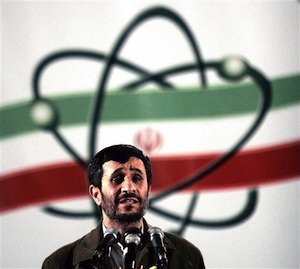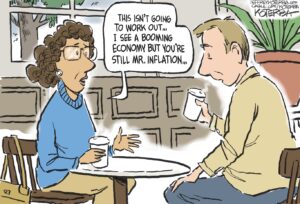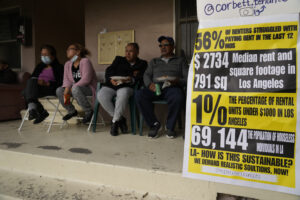What Will Tighter Restrictions on Trade in Iran Do?
A bipartisan team of U.S. senators has introduced a bill that would expand sanctions against Iran by targeting an estimated $100 billion worth of the country’s foreign currency reserves that are parked in overseas accounts. A Senate bill would expand sanctions against Iran by targeting an estimated $100 billion worth of the country’s foreign currency reserves that are parked in overseas accounts.
By Thomas Hedges, Center for Study of Responsive Law
A bipartisan team of U.S. senators has introduced a bill that would expand sanctions against Iran by targeting an estimated $100 billion worth of the country’s foreign currency reserves that are parked in overseas accounts.
The Iran Sanctions Loophole Elimination Act, authored by Sens. Mark Kirk, R-Ill., Joe Manchin, D-W.V., Susan Collins, R-Maine, Bill Nelson, D-Fla., and John Cornyn, R-Texas, and introduced May 8, seeks to penalize foreign financial industries that facilitate transactions with the Iranian government.
“We are putting financial institutions around the world on notice,” the senators said in a statement. “You must halt all foreign currency transactions on behalf of blacklisted Iranian banks and sectors or risk being cut off from the U.S. financial market.”
The new bill would sink Iran into its most severe era under U.S. sanctions, which were first enacted after the revolution in 1979. Restrictions on firms dealing with Iran were tightened in 1995 and then again in 2006. But the new measures, which would virtually eliminate Iran’s foreign currency reserves, are punitive enough, many say, to either topple the regime or spark another war in the Middle East.
But it is the poor in Iran who are suffering. Unemployment in Iran has risen to about 20 percent while inflation has surpassed 30 percent in the last year. The prices of staple foods such as chicken and rice have tripled in the last few decades, causing riots. Seventeen planes have crashed in the last 25 years, killing 1,500 people and pointing to a deteriorating infrastructure.
“This is a blunt instrument regardless of how many humanitarian products are allowed into the country,” Sammy Almashat, a health researcher at Washington, D.C., consumer advocacy organization Public Citizen, says about the sanctions. “When you cripple the economy, it leads to mass unemployment, which we’ve already seen in the last year or two.”
It is impossible to guide the impact of sanctions, Almashat says, adding that you can’t control one sector of the economy without affecting the others. Humanitarian exemptions paint a pretty but false picture and the U.S. knows what it’s doing, he argues.
The health sector in Iran has been hit especially hard by the sanctions. Although Iran manufactures about 85 percent of its pharmaceutical drugs, many imported chemicals needed to make those medications have been restricted. The U.S. argues that Iran could use many of those chemicals to make weapons. This means that the supply of drugs for cancer, diabetes and hemophilia patients — among others — have plummeted.
Many pieces of medical equipment have also been restricted for the same reasons. They have been labeled as “dual-use technologies,” meaning they can be applied for civilian purposes, such as in hospitals, or for military ones.
“At the end of the day, every serious observer recognizes that if you ruin the economy of a country, you inevitably make the people suffer,” Almashat explains.
It’s difficult to put a number on how many Iranians have died because of the sanctions. Iran is not an open government. The current regime doesn’t want the international community to think that it is helpless in the face of these measures, and consequently doesn’t acknowledge much of the suffering. We know, for example, that a 15-year-old boy died in November when he couldn’t get medicine for his hemophilia.
A month later, the Iranian government fired Health Affairs Minister Marzieh Vahid Dastjerdi, its only female minister, when she publicly declared that sanctions were devastating the health system. Dastjerdi said that of the $2.4 billion approved for medicine imports, only a quarter had come through because foreign banks refused to finance the shipments.
“Medicine is more essential than bread,” she said on state TV. “I have heard that luxury cars have been imported with subsidized dollars but I don’t know what happened to the dollars that were supposed to be allocated for importing medicine.”
In the case of sanctions on Iraq, it wasn’t until 2003 — 13 years after they were first implemented — that the effects on the country were fully understood. In one indicator, about 1 million infants died during that period.
Iran’s more hefty economy has allowed it to plow through American sanctions thus far. It has a larger manufacturing base than Iraq did and provides nations such as India and China with much of their crude oil imports.
For the U.S., this means having to impose sanctions for a longer period of time and squeezing the Iranian economy every few years in an effort to pressure the dissenting regime. It is, in the end, the same kind of economic warfare it waged on Iraq, only over a longer period.
The U.S. has very little interest in its purported goals of human rights and the halting of nuclear programs, according to Almashat. He points to the Oil-for-Food Program during the Iraq sanctions, which was fraught with widespread corruption, as evidence.
He says he does not consider sanctions a substitute for war.
“While the standard positions in the debate are framed as ‘war vs. sanctions,’ both positions represent a form of warfare — one military, the other economic — that both kill and injure the civilian population,” he says. “Rather than representing a principled alternative to war, sanctions serve as a complement and prelude to military action, as they weaken the country and thus pave the way for further aggression as they did in Iraq two decades ago.”
Almashat says the consequences of sanctions aren’t all that different from war itself. A lack of food, water and a proper infrastructure inevitably leads to people getting sick. He argues that they are under siege by an elusive enemy, one that uses economic restrictions instead of bullets to send innocents to the hospital.
It is easier, he says, to see the immorality in acts of terror like the Boston Marathon bombings than it is to recognize the horror in economic sanctions. At their core, both are designed to incite destruction and death, he contends.
The Boston bombings “were heinous acts that … killed people immediately,” he says. “In the case of sanctions — and with complicity from the media — people don’t necessarily see the connection between the sanctions policy and the harm to civilians. But even a cursory look makes it evident that these are harmful to civilians in the same way the Boston bombings were, except on a much larger scale.”
As Almashat points out, it’s also bitterly ironic that the biggest supporter of free market economics should use its economic power to completely control and regulate a foreign nation.
“One wonders what would happen if another country were to prevent the U.S. from trading, especially on essential goods. We appropriately would consider that to be a form of warfare,” he concludes.
This article was made possible by the Center for Study of Responsive Law.
Your support matters…Independent journalism is under threat and overshadowed by heavily funded mainstream media.
You can help level the playing field. Become a member.
Your tax-deductible contribution keeps us digging beneath the headlines to give you thought-provoking, investigative reporting and analysis that unearths what's really happening- without compromise.
Give today to support our courageous, independent journalists.






You need to be a supporter to comment.
There are currently no responses to this article.
Be the first to respond.